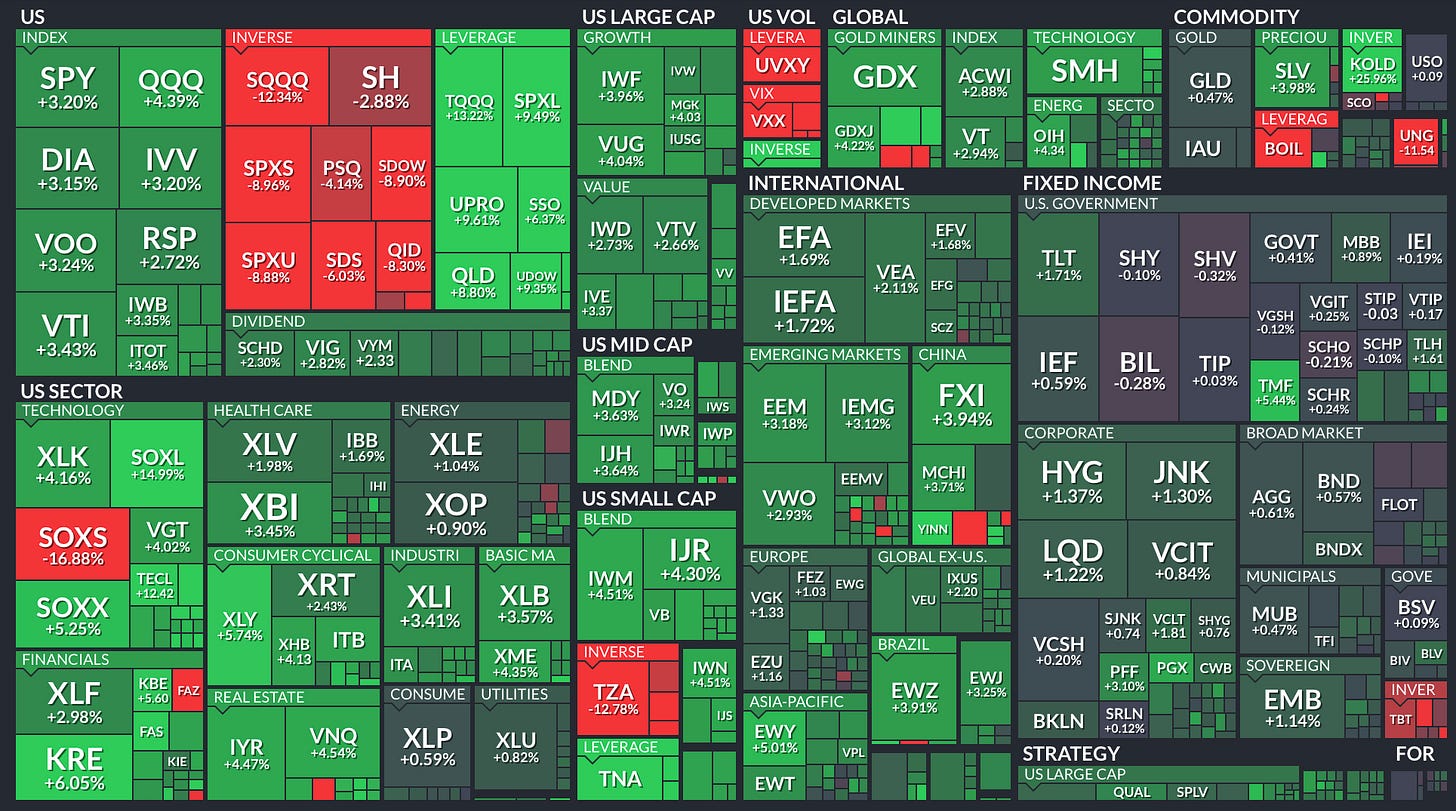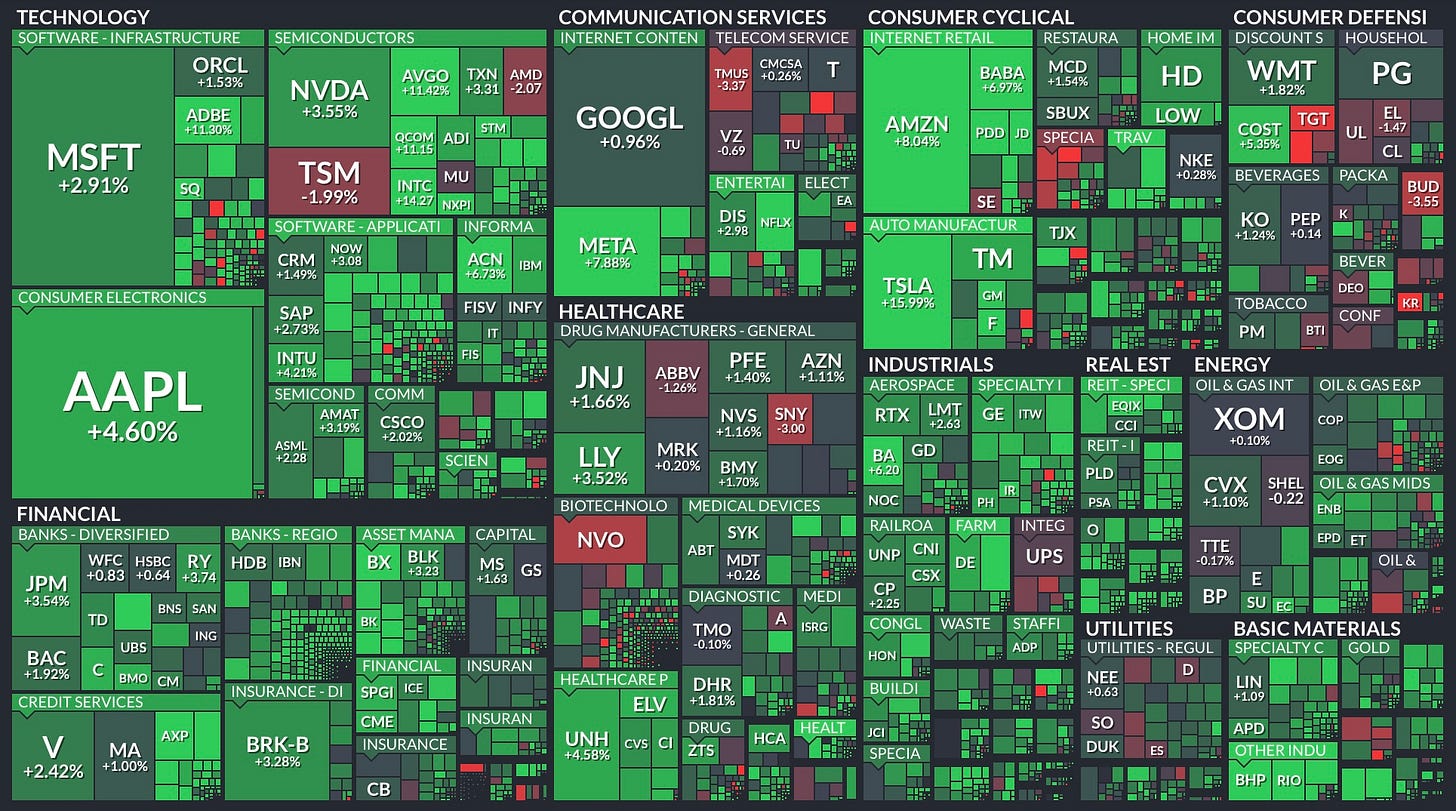📑 Research Notes for 2023-06-05
This week we look at the Congressional passage of the debt limit deal, the May jobs report, narrow market breadth, and slowing Chinese industrial output.
We conduct extensive investment research and share the most interesting content that we come across every week. Here is a curated list of this week’s top observations.
Do not reply to this email with any service requests, contact us for support if needed.
Last Week’s Market Performance Heatmap
🔗 Source
Senate Passes Bipartisan Debt Limit Deal, Awaits Biden's Signature.
The Senate has passed a debt limit deal with bipartisan support, which is expected to be signed by President Biden to avoid a catastrophic default. The president is set to address the nation about the deal and its importance in preserving vital programs. While the deal is a promising step towards fiscal sanity, there is still more work to be done to rein in excessive spending. The agreement does not limit emergency spending, which was a concern for some GOP Senators.
🔗 Source
U.S. Adds 339,000 Jobs in May, But Wage Growth Decelerates.
The US added 339,000 jobs in May, beating expectations and indicating a strong labour market. However, wage growth decelerated, with average hourly earnings rising by 0.3% and the year-over-year increase coming in at 4.3%, lower than expected. The unemployment rate rose to 3.7% from 3.4%, with more people losing jobs than gaining them. Professional and business services saw the largest job gains, with 64,000 new positions, while manufacturing lost 2,000 jobs. Construction added 25,000 jobs, reflecting a strong housing market.
🔗 Source
Narrow Market Breadth Poses Risk for Volatility and Correlation.
According to RBC's Wu Silverman, narrow market breadth is a problem as it affects volatility, correlation, and options. The market's narrowness can lead to violent rotations under the surface, despite the appearance of resilience. While there is potential for increased risk appetite and broader market play, the trigger for this change is questionable. FOMO is a potential trigger, as it exacerbates momentum and magnifies through options, leading to outsized moves. This phenomenon is not limited to Nvidia but can be seen in other stocks, particularly in Mega cap tech over the last five years.
🔗 Source
China's Manufacturing PMI Hits Weakest Point Since December.
China's manufacturing PMI has hit its weakest point since December, indicating weak demand for manufactured goods both domestically and externally. The country has been focusing on the services sector to recover, but even this area is showing a slowing pace of expansion. Optimism for the second half of the year is coming from expectations that the government will do more to counter the data. Weakness in the property sector is also a concern, with the PMI for mantles industries below 45 and the PMI for property services contracting. The overall weakness in the property sector is alarming for the government, which will need to do more to stabilize the market. While the 5% growth target is still achievable, the PMI is a more real underlying measure of sequential momentum, which is weakening.
🔗 Source
Curated by Joseph Lu, CFA®
Joseph is the founder and managing director of Conscious Capital Advisors, and a CFA® Charterholder.
🔗 Connect with us on LinkedIn or Twitter.
Have a question about what we shared? Email us at info@consciouscapital.pro.
Do not reply to this email with any service requests, contact us for support if needed.
The information presented in this newsletter is for educational purposes only and is not a solicitation or recommendation for any specific security, product, service, or investment strategy.
Investments involve risk and unless otherwise stated, are not guaranteed. Be sure to consult with a qualified financial advisor, tax professional, or attorney before implementing any strategy or recommendation you may read here.





